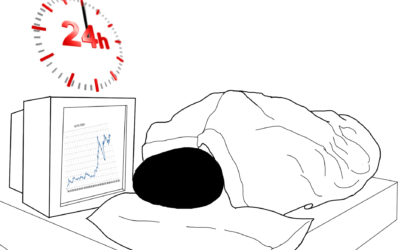When the U.S. stock market is a boom.
The foreign investors are likely to put their money in the stocks of this country because they want to invest in a high yielding investment.
As more foreign investors come into the US economy, the demand for the dollar increase.
This is because, to invest in the US equity market, you have to change your domestic currency into the U.S. dollars.
The increase in demand for the dollar strengthens its value.
When that happens the Forex market will rally to the upside because more traders will buy the USD.
Take a look at the Chart below
Dow jones and USD/JPY


The Dow Jones Industrial Average (DJIA) is traded on the New York Stock Exchange (NYSE).
It contains some of the largest companies in America.
The USD/JPY and the DJIA have positive correlation.
In this case, the 2 charts tend to move the same way and are always moving in the same direction.
From the above example, we used a monthly but any time frame can work.
The 2 moved in the same direction since 2012 to 2017.
You can rely on that to establish a trend direction on the USD/JPY in the Forex market.
How a falling stock market affects the forex market
If the stock market in the U.S. is doing poorly.
Foreign investors are likely to sell off their U.S. stock holdings.
This means investors change the U.S. dollars back into their domestic currency or other investments. As a result the U.S. dollar falls in value.
And this happens to all economies as long as there is an investment going on.
Take a look at the Charts below
DAX and the EUR/JPY


The Deutscher Aktien Index(DAX) is traded on the Frankfurt Exchange Market.
It contains most of the major 30 blue chip companies in German in the Euro zone.
You can use this information to determine the future value of the Euro and use it as a basis to trade the Euro pairs.
The above example shows a strong correlation between the DAX Index and the EUR/JPY on the market chart.
If you want to take a trade on EUR/JPY and the DAX Index is in a strong downtrend, prepare for a sell. The opposite is true.
As a Forex trader you can use this information to gauge your predictions in the market.
If you look at country’s stocks and they are going up then compare it with the currency and base on that to take a position.
A rising stock market is likely to influence a rise in the value of that country’s currency. Therefore you can base on that to take a long position.
Similarly
When a country’s stock market is performing poorly, you can sell that country’s currency because we expect a decline in the currency value following a fall in the stock market.
The correlation between stocks and Forex can change from time to time depending on the global financial condition.
When the correlation between the stock market and the forex market is negative
During the financial crises of 2007-2008,
the Nikkei and USDJPY were inversely correlated at some point. Later, they again moved in the same direction.
This is as shown on the charts below. Let’s take a good look.
Nikkei and USDJPY Charts


Like we said before, USD/JPY is always seen following the Nikkie 225 Index, and this makes them highly positively correlated.
When you take a look at the two charts above,
You can clearly tell that the two were moving in the same direction right from the beginning of the trend.
After July 18th, as identified by the red vertical line, we can see a difference in movement between the Nikkie 225 Index and the USD/JPY.
From the above chart on the left,
The Nikkie continued falling further to the downside after a small retracement, while the USD/JPY to the right, changed direction and moved upwards.
The negative correlation between Nikkie and the USD/JPY lasted for almost a month and the two are again seen moving in the same direction.
From the above scenario, if you were to rely on only correlation as confirmation to trigger your sell trades on the USD/JPY pair, by just looking at the Nikkie Index.
You would make a loss.
Yes; correlation can be relied on to trade currency but it is not perfect all the time.
Like any other indicators, it works best when combined with other indicators.
You can also trade correlation with technical analysis indicators and fundamental data analysis.
How long should you hold an Open Position ?
How long you can hold an open position in forex, is a personal thing for all traders. The decision is all yours. You know what your goals are as a trader, the kind of strategy you use to trade. All this starts from what you are? and What you want? If I am to answer,...
- Oh, bother! No topics were found here.



